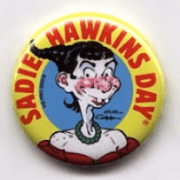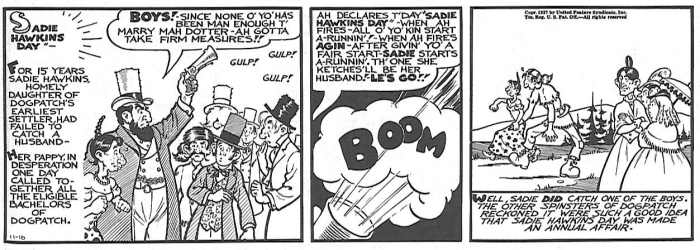November 8 is International Tongue Twister Day
Today is International Tongue Twister Day. Celebrate with these doozies chosen for their fun and difficulty. Will they leave you speechless? Read aloud and repeat, if you dare.
 In 2013, researchers at Massachusetts Institute of Technology (MIT) tripped up volunteers with the following word combination they declared the most difficult tongue twister in the English language.
In 2013, researchers at Massachusetts Institute of Technology (MIT) tripped up volunteers with the following word combination they declared the most difficult tongue twister in the English language.
Pad kid poured curd pulled cod.
It was judged to be even harder to say than a longstanding favorite introduced in 1990 by American expert (and MIT graduate) William Poundstone:
The seething sea ceaseth and thus the seething sea sufficeth us.
The Guinness Book of World Records, meanwhile, gave the following sentence its highest marks:
The sixth sick sheikh’s sixth sheep’s sick.
What are the elements of a tongue twister? Our brains can handle words that sound identical, like “I scream, you scream, we all scream for ice cream.” It’s the same story with words that sound very different from each other, such as “How much wood would a woodchuck chuck if a woodchuck could chuck wood?”
At a meeting of the Acoustical Society of America in San Francisco, CA, the MIT team presented its finding that different types of tongue twisters have different effects on our brains, lips, tongues, and throats as we produce mistakes in our speech.
Our brains get drawn up short when we attempt to jump between two nearly identical sounds, confusing one sound with the other. “She sells seashells on the seashore” twists the tongue because the sss and shh sounds are similar but not exactly the same. Speech errors also occur when we try to quickly repeat certain words or phrases. For instance, “toy boat” several times in a row turns into “toy boyt,” while “top cop” becomes “cop cop.”
Insight into such slip-ups may help researchers understand how humans process and plan speech. As we speak, we must coordinate movements of the lips, tongue, jaw, and larynx. Our brains may sort sounds by which muscles need to move to produce them, such as front-of-the-tongue sounds (sss), back-of-the-tongue sounds (ga), and lip sounds (ma).
“This implies that tongue twisters are hard because the representations in the brain greatly overlap,” Edward Chang, a neuroscientist at the University of California, told Nature.
Invite some people over for an International Tongue Twister Day party and have fun trying to say some of these whoppers.
Rubber baby buggy bumpers
I saw a kitten eating chicken in the kitchen.
Lesser leather never weathered wetter weather better.
Here’s a little tongue twister trivia to amaze your friends.
We all know this Mother Goose nursery rhyme:
Peter Piper picked a peck of pickled peppers;
A peck of pickled peppers Peter Piper picked;
If Peter Piper picked a peck of pickled peppers,
Where’s the peck of pickled peppers Peter Piper picked?
But did you know that it was inspired by the life of one-armed Frenchman Pierre Poivre? An 18th-century horticulturist and pirate, Poivre raided spice stores and smuggled the seeds back to France. Poivre often stole nutmeg seeds, which were nicknamed “peppers.”
Another famous tongue twister was taken from a song written in 1908.
She sells seashells by the seashore;
The shells she sells are seashells, I’m sure.
So if she sells seashells by the seashore,
I’m sure she sells seashore shells.
Terry Sullivan’s ditty paid tribute to Mary Anning, whose father taught her to find and dig fossils from the cliffs of Lyme Regis in Dorset, England. As an adult, she famously unearthed a previously unknown type of dinosaur, later named Plesiosaurus.
Which do you like? Which one is the hardest to say? Should a nonsense phrase like “pad kid poured curd pulled cod” be considered a tongue twister, or is it cheating? What do you think?
![]()


 No one could have predicted that Doctor Who would go on to be the longest-running science fiction television show in history. The original pilot was deemed unwatchable, scrapped and reshot, delaying the premiere by a week.
No one could have predicted that Doctor Who would go on to be the longest-running science fiction television show in history. The original pilot was deemed unwatchable, scrapped and reshot, delaying the premiere by a week. Today is Sadie Hawkins Day, an American rite-of-passage for generations of teenagers. Misogynistic, antiquated and awkward for all involved, the Sadie Hawkins Dance supposedly empowers girls to switch gender roles and ask out the boys. Did we mention it’s misogynistic and antiquated? The true
Today is Sadie Hawkins Day, an American rite-of-passage for generations of teenagers. Misogynistic, antiquated and awkward for all involved, the Sadie Hawkins Dance supposedly empowers girls to switch gender roles and ask out the boys. Did we mention it’s misogynistic and antiquated? The true 

